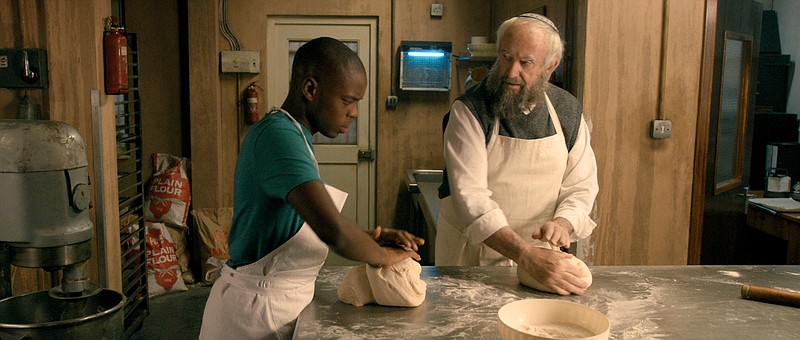If you go
› What: Jewish Film Festival.› When: 7 p.m. Wednesdays, March 30-April 27.› Where: Jewish Cultural Center, 5461 North Terrace.› Admission: $7; ticket price covers free kosher popcorn and a soft drink; on April 27, Passover snacks will be available.› Information: Jewish Federation of Greater Chattanooga at 423-493-0270.
Jewish Film Festival
Here are the trailers for each movie in the film festival plus the date they screen:› “Labryinth of Lies” (March 30): https://www.youtube.com/watch?v=6jGxe6auuTg› “Dough” (April 6): https://www.youtube.com/watch?v=Y7b4IoNRhtk› “Auf Das Leben” (April 13): https://www.youtube.com/watch?v=ne-HEaupWUc› “Kind Words” (April 20): https://www.youtube.com/watch?v=_jxWK1F6QJU› “A La Vie” (April 27): https://www.youtube.com/watch?v=5uJikUpZB8U
Israeli film critics have compared actor Tsahi Halevi to a young Al Pacino. He is dark and handsome and appears intense and sexy even at rest.
Chattanoogans can see him in the movie "The Kind Words" on April 20. The film is one of five in the annual festival at Chattanooga's Jewish Cultural Center. While the title sounds like a Hollywood romcom, the film is actually about two brothers and a sister in Jerusalem who discover as adults that each has a different father. They head for Paris and Marseilles to search for their biological dads. Halevi provides additional eye candy as the husband of the sister.
Does it sound like the kind of fluff that keeps Kate Hudson constantly employed? Maybe. But one of the goals of the annual film series is to show a spectrum of movies shaped by the Jewish experience, including crowd pleasers light and fun as confetti.
"We try to have films that are not set in concentration camps or during the Holocaust because we want the non-Jewish community to see the breadth of subject matter, genres and plots that the Jewish experience includes," explains Ann Treadwell, Jewish Cultural Center spokesperson. "The panel that selects the five films each year views more than 50 movies before it chooses what will be shown."
The approach produces bold choices like last year's courtroom drama set in modern Israel, "Gett: The Trial of Viviane Ansalem," about a woman's five-year fight to divorce from her husband. The film depicted - in unflattering detail - Israel's justice system where only courts adjudicated by rabbis can grant divorces and only after the husband gives his permission, a law spawned in the Ottoman Empire. "Gett" sparked protests in Israel to change the law and startled audiences outside of Israel who expected its judicial system to be as modern as its tech industry.
"Did we get blowback for showing that movie? Yes. But we want to encourage civil debate and discussion. We selected that film very specifically as an educational film," Treadwell says.
The 2016 series kicks off on March 30 with the equally provocative "Labyrinth of Lies," which captures a very odd period in Germany from 1958 to 1962 when the economy destroyed by the Third Reich was rebuilt and booming in a newly minted democracy. The plot, based on a true story, begins when a journalist recognizes a public schoolteacher as a former concentration camp "exterminator"; a young prosecutor investigates but then discovers that no one in the judicial system wants him to pursue the case.
Germans witnessed Nazi war criminal trials in Nuremberg from 1945 to 1949 yet, by the late 1950s, the national psyche seemed in denial about the Holocaust even as former Nazi officials became successful industrialists.
"By 1958, America and its allies were very worried about communism taking over the world. They didn't want to upset a new German democracy by pressuring it to pursue Nazi war criminals," says film series chairman Sanford Winer.
Schools and mass media sometimes concealed facts about the camps and, while it may seem hard to believe a nation forgets what it did during a worldwide war, Winer says that, even in America, it's possible to hide history.
"When I was in high school back in 1958, our history teacher told us slaves were better off with their masters than when they had their freedom," Winer says, then adds sadly, "Nothing in our history books really disputed that."
Elsewhere in the film series, a German and a French film share the title "To Life," and both are about friendships that survive crisis. On April 13, "Auf Das Leben" ("To Life" in German) debuts in Chattanooga. It tells the tale of an aging cabaret singer and a young German man who discovers he has a terminal illness. She and the young man forge an intense friendship that boosts their spirits and gives them a purpose in life they thought they had lost.
"They have a genuine friendship not a romantic bond," Winer clarifies, in case anyone mistook it for a cougar fantasy.
The French version of "To Life" - titled "A La Vie" - follows a trio of female friends from the end of World War II to 1962. The young women are Auschwitz survivors, but the camps are far away as the film unfolds in Paris and on beautiful French beaches. Emotionally, though, the trauma has shaped their lives to an extent they cannot fully grasp even as they begin sharing secrets on a beach vacation.
When asked if, in this post-"Sex and the City" era of "Orange Is the New Black" and "Broad City," the female friendships seem realistic. Winer defers to his wife, who also screened all the films for the series.
"The movie is complex. The women aren't flat stereotypes like party girl or athlete. It perceives what is distinctive about female friendships," says Elaine Winer. "You don't walk away depressed. It is life-affirming."
"Dough," which screens on April 6, takes place in London and offers a brazenly different mood and plot. Elderly Nat is desperate to save his failing bakery and hires a young weed-dealing Sudanese refugee named Ayyash. One day, Ayyash accidentally drops his stash into the dough, and the pot-laced challah bread is a gigantic hit with customers. Critics praised the movie for its realistic portrayal of a warm and caring friendship between residents of wildly different worlds.
The $7 ticket price for each film in the festival also gives attendees a free soft drink and kosher popcorn but, in honor of "Dough," moviegoers will also get brownies to soothe the munchies.
All movies should be suitable for ages 16 and older but, if parents want to get more specific advice about each film, Treadwell is happy to help at 423-493-0270.
"You don't have to be Jewish to enjoy these films; we welcome everyone," she says.
Contact Lynda Edwards at ledwards@timesfreepress.com or 423-757-6391.

